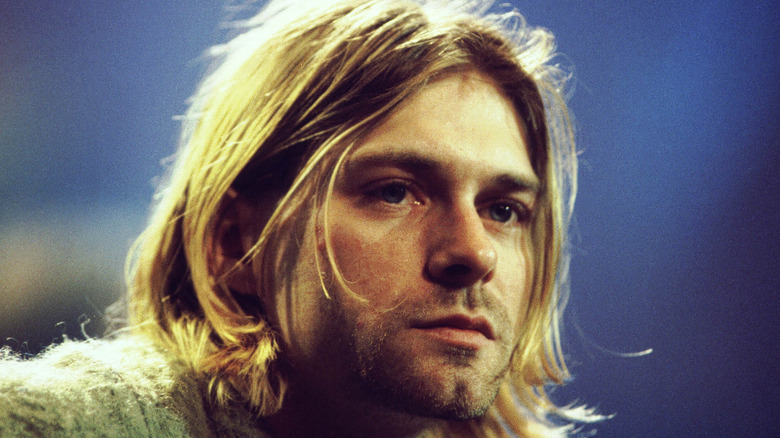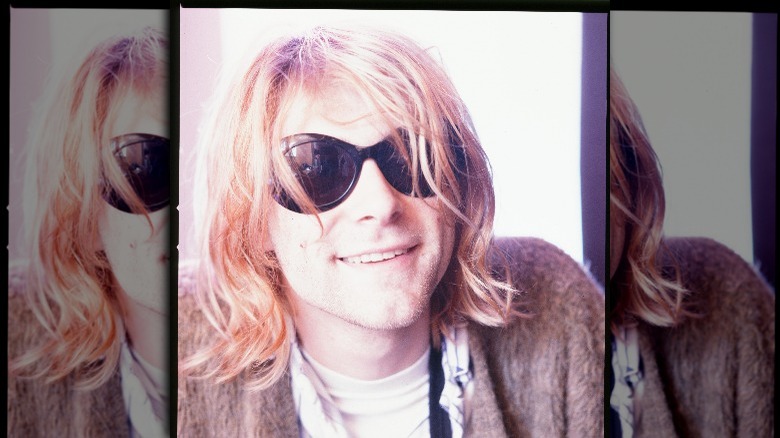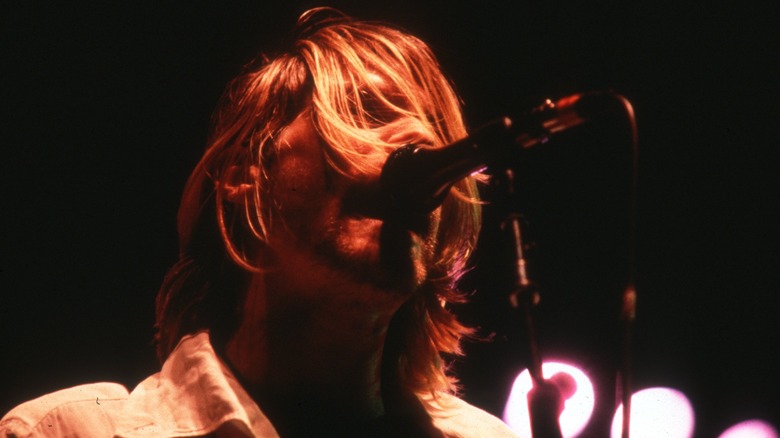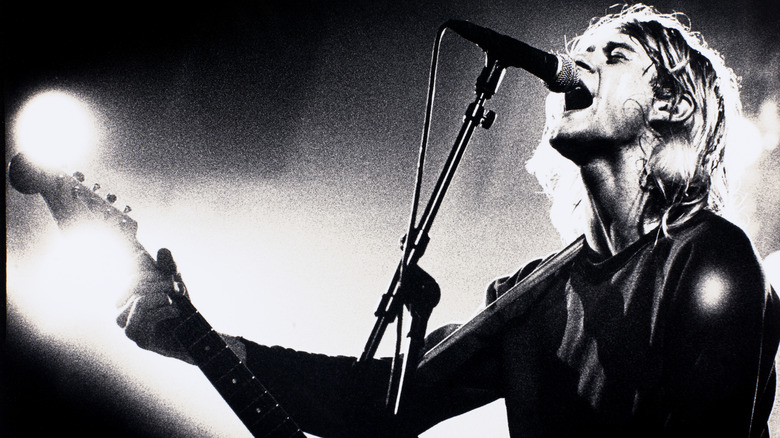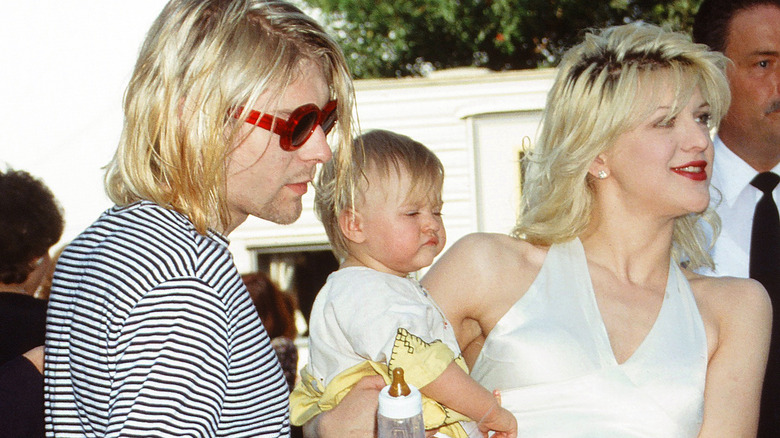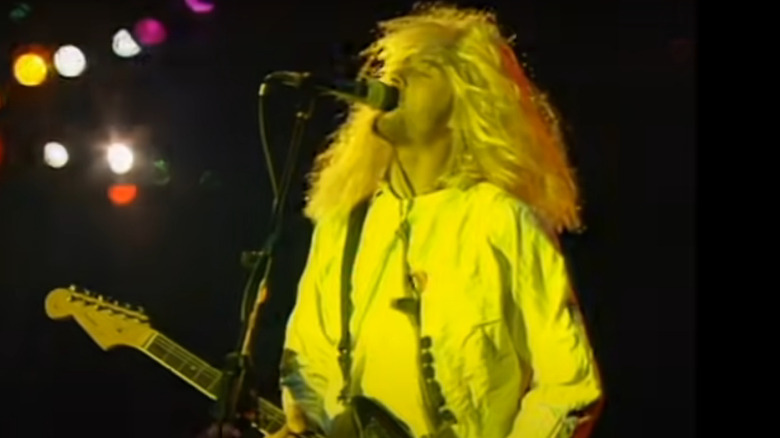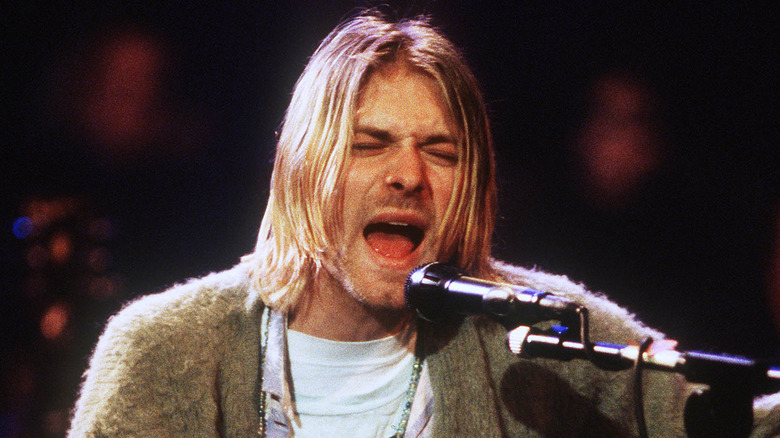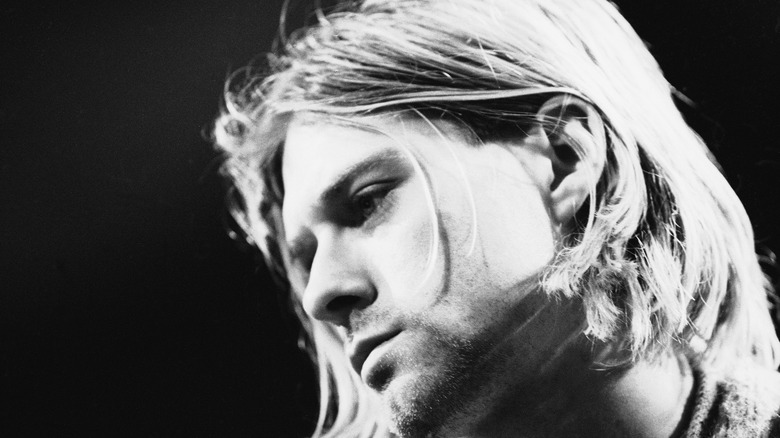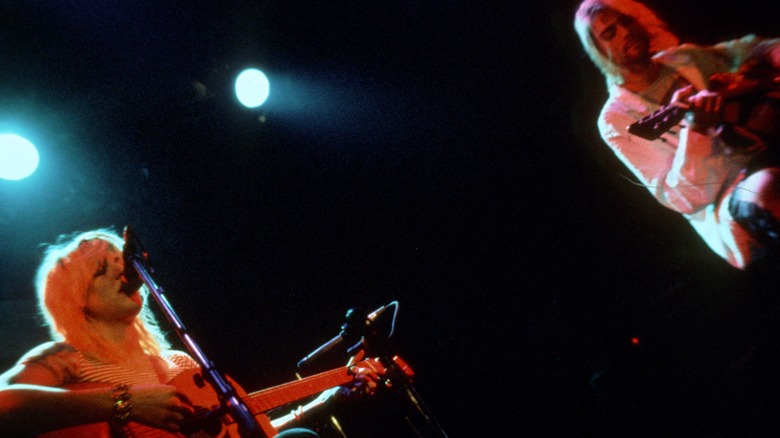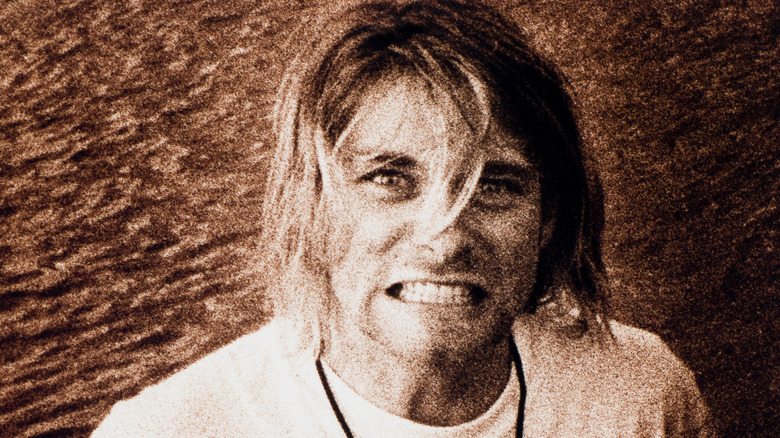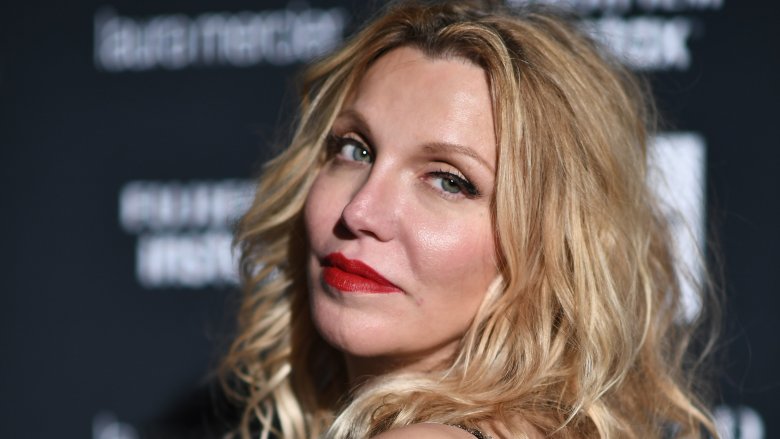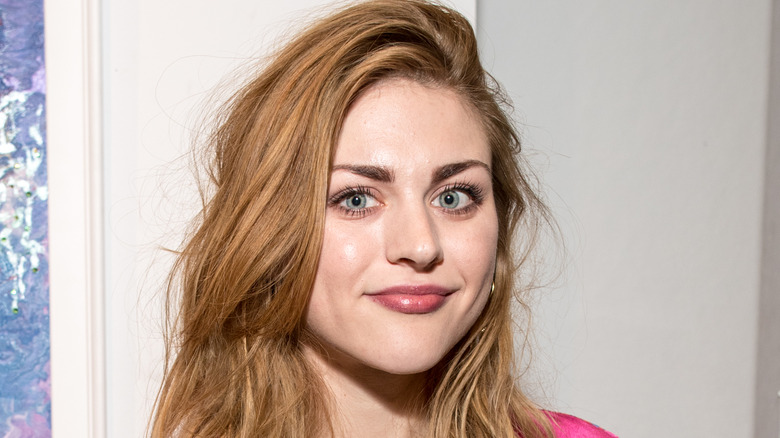Kurt Cobain's Tragic Real-Life Story
Kurt Cobain famously said, "My story is exactly the same as 90 percent of everyone my age." With all due respect, he was wrong. Yes, many people his age came from unhappy homes and brimmed with impotent unrest. But how many of them could turn their discontent into trenchant lyrics and sing like a chain-smoking angel? How many became the face of grunge and fronted Nirvana, a band that defined the 1990s and is widely considered one of the greatest bands ever?
Something in the way Cobain expressed himself transcended words, which is why when he took his own life at the age of 27, the world knew it had lost a great artist. That's also why his story has been passionately examined and debated over the years, and why it's being revisited here. Obviously, everything can't be covered. In fact, it's unclear what "everything" is. As Cobain's longtime friend Buzz Osborne remarked, "It matters very little what the facts are; what matters is what people believe. And when it comes to Cobain, most of what they believe is fabricated nonsense." Here's an honest portrayal of the man and the misery behind one of rock's most mythologized tragedies.
And if you wouldn't mind I would like to lose
When Kurt Cobain was in junior high, he joined his school's wrestling team, not because he wanted to but because his father Don Cobain pressured him to. According to People, Cobain hated sports. He also hated hunting, school, his life, and his hometown of Aberdeen, Washington, which he said was "full of bigoted rednecks." During an important wrestling match, he decided to push back. While his father sat in the audience, Cobain simply let himself get pinned.
For years Cobain had been fiercely uncooperative. Deemed hyperactive as a child, he received Ritalin to help him concentrate and took sedatives to fight the insomnia caused by the Ritalin. Cobain's surlier side emerged when he was 8. That's when his parents divorced. Before his folks split, Cobain was an upbeat kid who sang Beatles tunes and drew pictures. Afterward, he still drew pictures, but he captioned them "Mom Sucks" and "Dad Sucks."
School also sucked. A friend later said Cobain "stood out like a turd in a punch bowl." He dyed his hair "wild colors" and sometimes spat at "jock types" who sometimes beat him up. Per the Independent, Cobain recalled that many of his peers thought he was gay because he hung out with girls and gay people and had a hard time finding male friends. Cobain wasn't gay, but he wished he was "just to piss off homophobes."
I'm a negative creep and I'm stoned
Growing up, Kurt Cobain got ping-ponged between his parents and lived with various other relatives because nobody knew quite how to handle him. His deep-seated hurt drove him to lash out, smoke pot, and ultimately quit school, though, as NME points out, even if he had stayed in school, he would have failed to graduate. He also failed to find a job, so his mom kicked him out.
Cast adrift, Cobain got by (and probably high) with a little help from his friends. He slept on their couches and in the backs of vans. He landed and lost jobs intermittently, even working part-time at a janitor at his high school. Legend has it that Cobain also slept under a bridge, though his buddy Buzz Osborne called that story a load of fecal matter. Coincidentally, Fecal Matter was also the name of a punk band Cobain formed in 1985 and which Osborne later joined.
Fecal Matter marked an improvement in Cobain's circumstances. He formed the group after moving in with an aunt whose home doubled as a music studio, and his band served as an emotional outlet and an opportunity for 18-year-old Cobain to hone his songwriting abilities. He would form and dissolve other bands, but Fecal Matter was what made future Nirvana bandmate Krist Novoselic interested in working with Cobain.
With the lights out it's less dangerous
Many people view Kurt Cobain as a fragile-hearted poet who shattered under the pressure of undesired fame. It's a compelling narrative, but Time argues there's more to the story. Nirvana's ex-manager Danny Goldberg said Cobain "definitely wanted to be famous" and "worked assiduously" to build Nirvana's popularity. Moreover, Cobain's emotional fissures started showing years before Nirvana rocketed to superstardom with its 1991 album "Nevermind."
In 1989 Cobain had a nervous breakdown while performing in Rome. As detailed by Rolling Stone, Nirvana was promoting its first album, "Bleach," when Cobain suddenly smashed his guitar, ascended a dangerously high stack of amps, and threatened to jump. He was dissuaded from doing so but seemed intent on splitting up the band.
The documentary "Montage of Heck" has suggested that the singer attempted suicide as a teenager by lying across train tracks, which Cobain described in an audiotape he made in 1988. Multiple people who knew the musician, including Nirvana's Krist Novoselic, Cobain's wife Courtney Love, and former schoolmate Buzz Osborne have expressed doubts that it actually occurred, and documentary creator Brett Morgan acknowledged that his goal was to present "an emotional truth." However, the facts suggest that Cobain struggled with suicidal ideation long before his spotlight turned incandescent.
If you or anyone you know is having suicidal thoughts, please call the National Suicide Prevention Lifeline at 1-800-273-TALK (8255).
I've been locked inside your heart-shaped box
According to the book "Heavier Than Heaven" (via The Daily Beast), one of rock's most beloved men "first locked eyes" with one of rock's most hated women at a nightclub in Oregon in 1990, "and within 30 seconds they were tussling on the floor." Nirvana was booked to play, and Courtney Love had a friend with personal ties to the opening act. Love took a playful jab at Kurt Cobain's appearance, and he retaliated with flirtatious wrestling (literally).
For Cobain, it was lust at first sight. Love became infatuated after listening to Nirvana's music and taking the time to notice "how cute Kurt was." They met again in 1991 and discovered they both enjoyed guzzling cough syrup. Love would later say they "bonded over pharmaceuticals." Before long, they bonded physically, and in February 1992, they got married on a cliff in Waikiki. Several months later, Love gave birth to their daughter. The rest is hearsay.
Cobain characterized his relationship with Love as a union of opposites, "like Evian water and battery acid." Many call it a case of fly meets spider, with Love as the conniving arachnid. However, Michael Azerrad, who wrote the Nirvana biography "Come As You Are," cast doubt on that assessment — "Kurt had a very strong will and was not easily pushed around. Unless you can do a Vulcan mind meld with Courtney, I would think twice about second-guessing her motives."
In her false witness
Nirvana's third and final studio album, "In Utero," contains a track referencing 1930s actress Frances Farmer. Per NME, Kurt Cobain likened himself to Farmer, partly because of the negative press they both received. Perhaps he also compared the actress to Courtney Love, who married Cobain while wearing a dress once owned by Farmer and who received so much unflattering coverage that Cobain threatened to end Nirvana.
As the Los Angeles Times describes, in 1992 rumors emerged that Cobain was at death's door after overdosing on drugs. The singer mocked the gossip during a United Kingdom music festival by wearing a wig and a hospital gown and feigning collapse. When addressing claims made about his wife, he was far less flippant, telling the audience, "There have been some pretty extreme things written about us and especially my wife. She thinks everybody hates her now."
On September 1, two days after the festival, Vanity Fair published an article insinuating that Love got her husband hooked on heroin and heavily implying that she used the drug while pregnant with their daughter, Frances. As a result, Frances was briefly taken from the couple, notes Biography. (Love eventually admitted to taking heroin before realizing she was pregnant.) Horrified, Cobain wrote a letter to boss David Geffen in which he decried the Vanity Fair piece as "a crucifixion" and voiced his desire to exit the sour limelight. As Cobain emphatically put it, "f**k Nirvana."
I own my own pet virus
Heroin users often say the drug gives them an intense "rush" of pleasure. But Kurt Cobain claimed he turned to the drug for one of its other known effects — pain reduction. As reported by Billboard, in a 1992 diary entry he attributed his heroin abuse to an "uncomfortable stomach condition" that physicians couldn't identify.
The singer had recently left rehab and apparently felt the need to respond to concerned admirers. As if trying to downplay his addiction he wrote, "So after protein drinks, becoming a vegetarian, exercise, stopping smoking, and doctor after doctor I decided to relieve my pain with small doses of heroine [sic] for a walloping 3 whole weeks." However, according to his friend Buzz Osborne, the singer told him "there was absolutely nothing wrong with his stomach" and that he invented an ailment "for sympathy and so he could use it as an excuse to stay loaded."
It's worth noting that Cobain was loath to confirm his substance abuse publicly because he feared his fans and eventually his daughter might imitate him. That might explain why he made a point of discouraging heroin use in his journal entry: "It was a stupid thing to do and I'll never do it again and I feel real sorry for anyone who thinks they can use heroine [sic] as a medicine because um, duh, it don't work."
If you or anyone you know is struggling with addiction issues, help is available. Visit the Substance Abuse and Mental Health Services Administration website or contact SAMHSA's National Helpline at 1-800-662-HELP (4357).
And I swear that I don't have a gun
Even casual fans of Nirvana may have noticed the band's biggest hit, "Smells Like Teen Spirit," mentions guns ("Load up on guns, bring your friends"). Firearms also notably appear in "In Bloom" ("And he likes to shoot his gun") and "Come As You Are" ("And I swear that I don't have a gun/No I don't have a gun"). While it's obviously a stretch to call those lines foreshadowing or anything close to it, Kurt Cobain's lyrics sometimes provided insights into his experiences and inner turmoil, and guns featured prominently in his life.
According to the Independent, as a teen Cobain witnessed his mother threaten his stepfather with a rifle before tossing his gun collection into the river. Cobain snagged the guns and sold them to purchase his first amp. Firearms also caused strife in Cobain's marriage, as Courtney Love didn't want guns in their home. In 1993 that disagreement sparked an ugly exchange that ended with Nirvana's lead singer getting hauled off to jail.
Per the Seattle Times, police arrested Cobain for allegedly pushing Love to the floor and choking her during an argument about guns he had recently purchased. Love would later deny being assaulted, but she told officers at the scene that Cobain attacked her. Plus, she had scratches from an apparent struggle. Nearly a year later, authorities would return when Cobain threatened to shoot himself.
Overdo it and have a fit
For years Kurt Cobain's friends and family watched him dive deeper and deeper into heroin addiction and depression. They tried with all their might to pull him ashore, but he refused to be rescued.
Per Rolling Stone, between 1992 and 1994, Cobain faced a string of self-made adversities. When his daughter was briefly taken from him by child services over his and Courtney Love's heroin use, he got her back and then got back on heroin within weeks. Over the ensuing months he had multiple domestic disputes interspersed with overdoses and suicidal threats.
In the final days of his life Cobain "was out of his mind on heroin," according to Nirvana bassist Krist Novoselic (via NME). For weeks leading up to the end, he'd been building to a sad crescendo. In March, the singer had seemingly attempted suicide while in Rome. Nirvana had hit the pause button on a hectic European tour, per Rolling Stone. Instead of heading home, Cobain checked into a five-star hotel and ingested a lot of tranquilizer pills. He lived, but not long after returning to his Seattle home, he locked himself in a room with a revolver and said he would squeeze the trigger. Authorities removed the firearms from Cobain's home, but two weeks later he convinced a friend to help him buy a shotgun, claiming he needed it for home security.
All apologies
Those close to Kurt Cobain fought desperately to save him from himself. Ex-Nirvana manager Danny Goldberg sent him to "innumerable doctors and therapists" (via Rolling Stone). Courtney Love, Nirvana members and managers, Cobain's mom, and other worried relatives staged an intervention. In a last-ditch effort, Love invited Cobain to join her in Los Angeles for rehab. None of it worked. For a moment, there was a faint glimmer of hope, as he traveled to Los Angeles and entered a treatment facility. He escaped two days later, apparently by hopping a 6-foot wall. Several days later he was dead.
An electrician would find his body on April 8. Lying across his body was a shotgun. Among the items discovered at the scene was a note in which the singer revealed that his passion for music had evaporated, adding that "it's better to burn out than to fade away." Cobain's final words were reserved for his wife and child — "I love you, I love you."
If she floats then she is not a witch
When Kurt Cobain died, some fans not only mourned the loss but fixated on it to the point that his death gained its own fandom. That macabre fixation became so fashionable that two decades after the Nirvana front man ended his life, people printed his suicide note on T-shirts and sold them on eBay and Etsy. Cobain also became prime fodder for conspiracy theorists, who insisted that the rock star met a suspicious end.
Seemingly unwilling or unable to accept the thought of him succumbing to mental illness, a vocal contingent of armchair sleuths pointed the finger at Courtney Love. A 2015 docudrama pretty much accused her of murdering her husband. In 2014 The Guardian reported that her estranged father implicated her in Cobain's death while trying to market a book he wrote about her.
The circus sideshow surrounding Cobain's death became a horror movie when conspiracy theorist Richard Lee entered the picture. According to Love, he "stalked and harassed" her and her family "for many, many years." Lee, who apparently spent 23 years trying to solve Cobain's suicide, even sued to have graphic images of the singer's body released for public consumption. Thankfully, he failed.
If you or someone you know is struggling with mental health, please contact the Crisis Text Line by texting HOME to 741741, call the National Alliance on Mental Illness helpline at 1-800-950-NAMI (6264), or visit the National Institute of Mental Health website.
I miss you, I'm not gonna crack
Frances Bean Cobain was just 20 months old when her father died. Despite barely being raised by Kurt Cobain, Frances grew up seeing him everywhere. "I was around 15 when I realized he was inescapable," she told Rolling Stone. "Even if I was in a car and had the radio on, there's my dad." She would end up marrying a man who was so obsessed with her father that he attempted to look like Kurt Cobain and even took possession of Kurt Cobain's guitar when he and Frances divorced.
Understandably, years of being inundated with reminders of a father she couldn't remember took a toll. It probably didn't help that she lived in 27 homes in 25 years and quit high school in 10th grade. "I defaced my room, all the walls and doors and ceiling," Frances later recalled. She also turned to drugs to ease her pain.
In 2018 Frances found a more positive outlet, an art exhibit dedicated to Kurt Cobain's upbringing. Rather than retreating, she has embraced vicarious memories of her father, even quoting a phrase from his suicide note ("peace, love, empathy") in an effort to reclaim the power of the words. One can only speculate about how different her life would be if Kurt Cobain overcame his own demons, but Frances had a pretty clear idea — "I would have had a dad. And that would have been an incredible experience."
